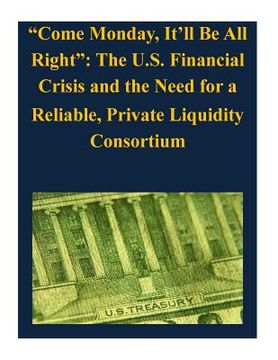Compartir
"Come Monday, It'll Be All Right": The U.S. Financial Crisis and the Need for a Reliable, Private Liquidity Consortium (en Inglés)
Penny Hill Press
(Ilustrado por)
·
Createspace Independent Publishing Platform
· Tapa Blanda
"Come Monday, It'll Be All Right": The U.S. Financial Crisis and the Need for a Reliable, Private Liquidity Consortium (en Inglés) - Penny Hill Press ; U. S. Library of Congress
$ 28.50
$ 39.58
Ahorras: $ 11.08
Elige la lista en la que quieres agregar tu producto o crea una nueva lista
✓ Producto agregado correctamente a la lista de deseos.
Ir a Mis Listas
Origen: Estados Unidos
(Costos de importación incluídos en el precio)
Se enviará desde nuestra bodega entre el
Jueves 25 de Julio y el
Jueves 01 de Agosto.
Lo recibirás en cualquier lugar de Internacional entre 1 y 3 días hábiles luego del envío.
Reseña del libro ""Come Monday, It'll Be All Right": The U.S. Financial Crisis and the Need for a Reliable, Private Liquidity Consortium (en Inglés)"
During the 2007-2008 Financial Crisis, several large U.S. financial institutions either faced insolvency or became insolvent as investors lost confidence in the financial system and traditional funding sources evaporated. Self-preservation efforts led many banks and broker-dealers to seek (often unsuccessfully) funding from private equity firms, competitors, and sovereign-wealth funds. Warren Buffett received several such funding requests because he had ready access to large amounts of capital and an investment from a trusted and savvy investor such as Buffett carried an imprimatur that the investment was likely to be sound . But not even Mr. Buffett had sufficient resources to single-handedly recapitalize the many struggling U.S. financial firms. Nevertheless, other avenues for private funding seemed haphazard and potentially hazardous for many U.S. financial firms as they struggled to survive in a dangerous world that they helped to create but that now seemed destined to destroy them. In the absence of trusted and reliable sources of private funding, struggling firms were forced either to submit to an uncertain and unwieldy bankruptcy process or to risk being subjected to an ad hoc government-facilitated take-over, the terms for which were opaque and seemingly subject to change at a moment's notice. Transactions where public funding was used were sure to provoke public outrage and a painful berating by Congress. The public outcry over such taxpayer-funded rescues and the absence of more politically palatable alternatives led Congress to include provisions in the Dodd-Frank Wall Street Reform and Consumer Protection Act ("Dodd-Frank Act") that provide a framework for a government liquidation of a struggling financial firm that is not federally insured and that poses a significant risk to the financial stability of the United States "that mitigates such risk and minimizes moral hazard. Although the Dodd-Frank Act and the Rules of the Federal Deposit Insurance Corporation ("FDIC") Promulgated under the Act codify and clarify the government's authority to take over a struggling non-bank financial firm, they may not make that alternative much more politically palatable than the ad hoc approaches used during the Financial Crisis. While the Dodd-Frank Act liquidation provisions are conceptually similar to those that apply to federally insured institutions, important differences could diminish the effectiveness of the former. For example, the FDIC guarantee for customer deposits of insured entities, a cornerstone of the FDIC liquidation scheme upon which the Dodd-Frank Act liquidation provisions are based, has no counterpart in the new law. As a result, customers of struggling non-insured firms would be left to fend for themselves either in proceedings of the Securities Investor Protection Corporation ("SIPC"), if applicable, or in court where they could be required to battle with competing creditors whom the new law may put on firmer footing. Without clearly defined protections for customers and would be creditors of uninsured firms, the Dodd-Frank liquidation provisions could increase the risk of a "run on the bank" type scenario for such firms if it appeared that a government liquidation of the firm was likely.

